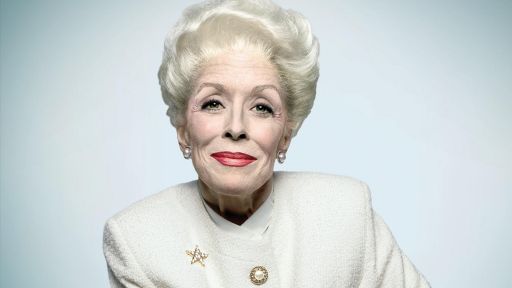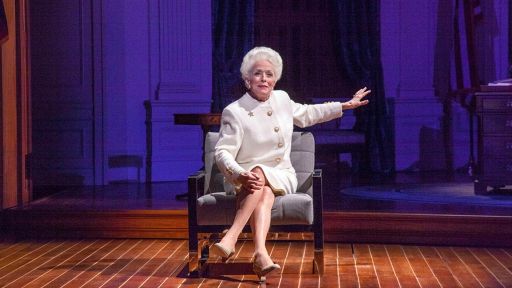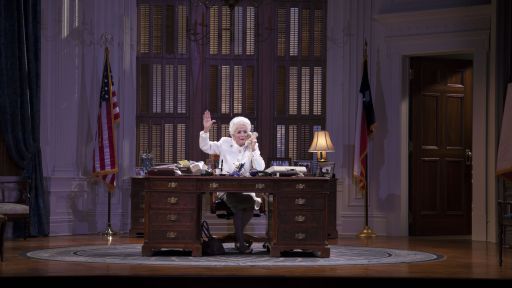By Holland Taylor

PC: Ave Bonar
A couple years along with my play about Governor Richards, it wasn’t lost on me that my adventure shared elements of a big ol’ political campaign- but one where I was the candidate, campaign manager, volunteer staff, and major donor, too! The magical element of being a sort of hologram of a beloved and spirited leader, enraptured me as much as the evocation of Ann Richards in the play captivated the flocks – young people learning about her, Texans who adored her and miss her now, and, most tellingly for me, her close friends and colleagues. Even her family, were, in varying degrees, at a little distance, swept up in the memory and the fireworks celebration.
Of those who were really close with Ann, some were afraid to come to the play- having heard that it was true to her and would strongly bring back that moment of her glory, and that decade of even greater national fame and favor after her time as governor. They were loath to find themselves trapped, fourth row center, in theaters in Galveston, San Antonio, Austin, Chicago, Washington DC., and New York City – awash in floods of tears. But they did come — certainly the big deal, bad-ass women in her administration – several closest colleagues attending the show and bringing family to every run in every city, multiple times. Cecile Richards, Ann’s eldest daughter and the then President of Planned Parenthood, who attended often because of benefits and talk backs she was involved with, probably saw the show seven times, on Broadway alone. (Eventually I will have a medal struck for her service.)
I knew these fabulous women in a very special, significant way. They were sharing with me an epoch in their lives that was profoundly meaningful and which, in a way, had ended twice, – once when Ann did not win her second term, her glorious tenure coming to a sad, mournful end, when her staff of 300 working in the majestic pink granite capitol, trudged away in all directions, leaving behind for the archives, boxes and boxes and boxes of paper files- enough to cover four football fields— and then again when Richards died rather suddenly, at the – for her- ridiculously young age of barely seventy three. There was no kind farewell for anyone, for anyone who cared about Ann, even with the comet roaring and flaming into the ocean twice. Many regular folk and also her closest friends, have spoken of some sense of closure or blessing they felt the play brought, and this makes me happy. Any great loss takes many stages of thinking and feeling for restoration of some sort of peace, and a funeral or memorial is just the beginning. The play is meant to be a celebration, and as such, served that wish. If one can truly celebrate, that is stepping towards the recovery of joy and living on.
For me, the “meta” nature of my own ‘campaign’ unfolded with an inexorable reckoning. Even to play someone who was a glorious shooting star means there will be a final fated plunge, hissing into the sea. Just as a campaign ending with a loss has a terrible aftermath of debris, human and otherwise— ending a run where one has been intimate with greatness ends with instant wreckage. Closing a show in which you are the solo performer is going to be a staggering change. Emphasis on staggering. After a long run, you are suddenly sprung from an exhausting, rigid routine that instills fear from the start, that something– illness, an accident of fate, a crisis, demands of family- some interpersonal mayhem, will interfere with the relentless, indisputable commands of the show’s clock~ even the schedule for eating and sleeping has a tense rigidity. ANN ran for 151 performances at Lincoln Center — eight a week – when six a week is the norm for one person shows, in recent decades. There was a three-hour prep, so the “I had no life” line was kind of true. No life – except for the borrowed glory from Ann herself, during those two triumphant, joyful hours on stage – then talking and laughing with those who came backstage after the show, my own theatre folk, and denizens of the ANN Nation. It was a high spirited, story-sharing, happy green room, full of inspiration and goodwill.
But the run was so extraordinarily taxing that my particular treadmill seemed to flay me alive. By the time we had played our last ANN, I wondered about my mind. I had done all those performances perfectly, two hours alone on stage, a huge text with nary a pause- but the day after we closed, wanly having my morning coffee, my forehead heavy in my propped-up hand, I actually could not remember how the ‘big speech’ in the second act began. I was simply unable to ‘re-enter’ the world of the play. I had become an exile in a twinkling, my body rejecting the old neuro-pathways and my heart constricting with the realization that the show’s army of producers, crew, theatre staff and designers, an army of which I had been the general, an army of dedicated, exuberant souls who had surrounded me as my whole society- had disbanded closing night under cover of darkness, and all had rolled away on their carts.
For me, it was all very meta. I came to understand, finally, in the years after that fall into a chasm, that of course, there is a price to pay for any time we spend close to the sun. In Ann’s case, the price of being like the sun.
There are a couple of things I think the play says, beyond the entertainment of her company. Ann, the person, made people feel that yes, there are leaders who are authentic- who truly serve the public out of a core passion for the common good. ANN, the play, lets people feel the truth of that, and especially given today’s world, they are heartened. Ann herself always looked ahead, never back. She believed good leaders always will come– I even have a recording of her saying essentially just that. She believed society is always evolving, however gradual it may be, and however the ball seems to roll backwards as it turns. I remember her joking about Mao Tse Tung, who, when asked what he thought of the French Revolution, said, “It’s too soon to tell.”
Many people feel sadness in the play; it is hard to see her go. But audiences leave full of excitement; the light she shone is in us still. Even I, whose papier maché wings melted and let me fall, happily stand back here on earth, a mere mortal- who served at the pleasure of the governor, paid the tarif for the ride, and am almost impossibly enriched by the adventure. Losing is merely a step along the way of having it all.
Ann’s light shines bright.




